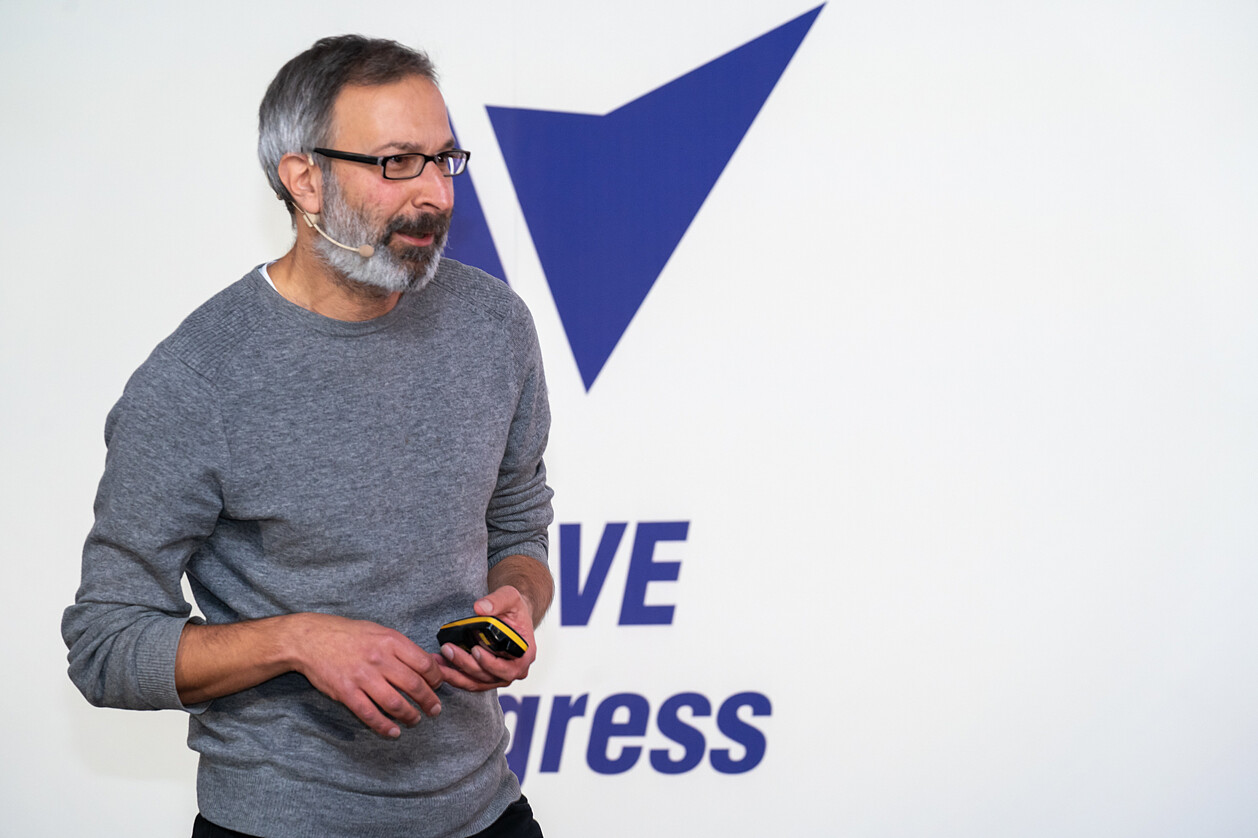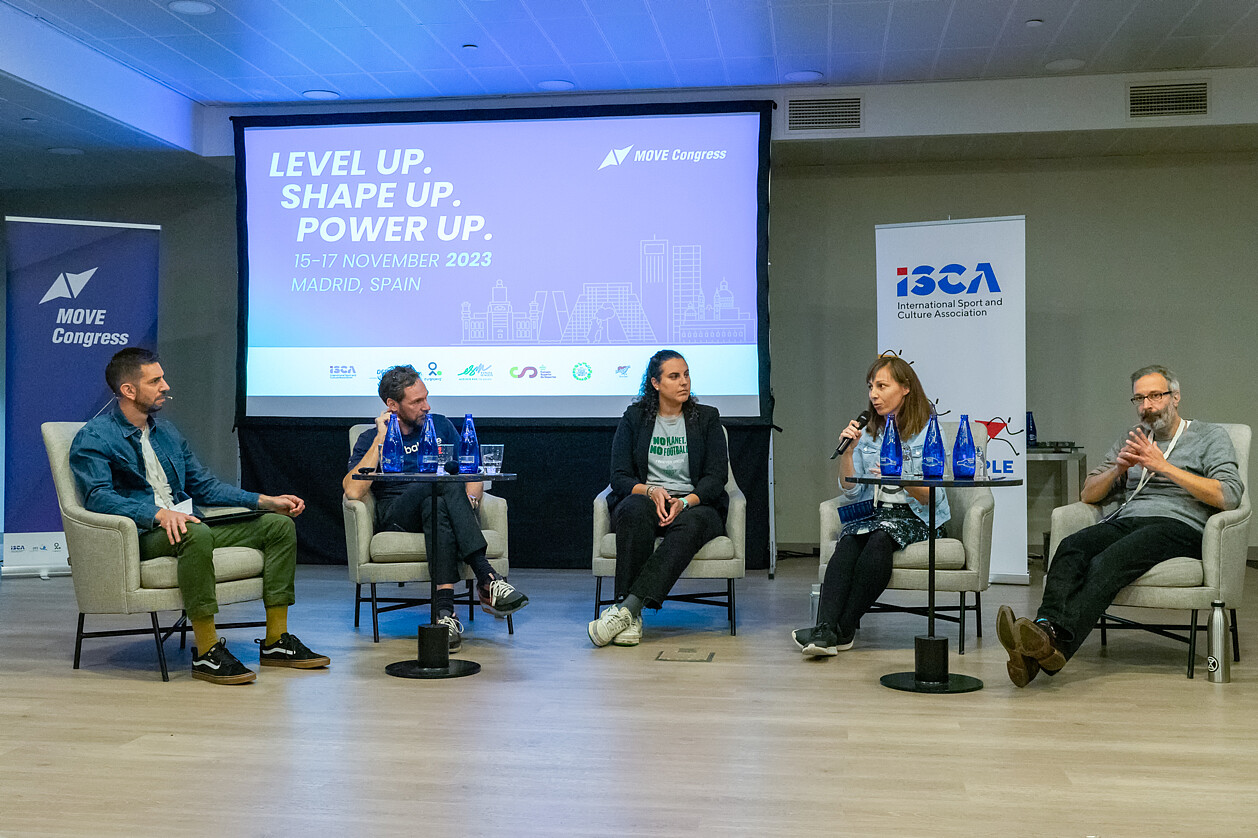
When people and sport power combine: how grassroots sport leaders can collaborate for better planetary health
Karim Abu-Omar’s keynote presentation on “grassroots sports and planetary health” led the way for a full day of conversations around sustainability in sport at the MOVE Congress 2023 on 16 November, which continued through a dynamic panel with leaders in the sector and a hands-on workshop to practice what was learned. The world is facing a climate crisis of great dimensions, but there are still great tools at hand to tackle it, and grassroots sport could be one of the most powerful.
“Let’s have a look at our planet!” With that invite, Karim Abu-Omar, lecturer at the Department of Sports Science and Sport at Friedrich-Alexander-Universität Erlangen-Nürnberg (FAU), opened his presentation, walking the audience through staggering data about the current state of the global climate crisis. From record-setting temperatures to peak carbon emissions, Abu-Omar stressed that evidence shows that the situation asks for urgent action, and sport plays a crucial part in it.
The climate crisis directly impacts the practice of sports, but it is also heavily impacted by it. Construction and maintenance of sport facilities, production of clothing and equipment, transportation to and from sport venues, and waste at sporting events are some examples of how both elite and grassroots sports can harm the environment. On the other hand, they can also serve as agents of positive change, collaborating for better planetary health.
Planetary health and grassroots sport
While pointing out the vicious cycle nature of the relationship between sport and the environment, Abu-Omar proposed a shift in the concept of health to adopt a holistic perspective that encompasses the individual, population, and planetary aspects. This means prioritising what is good for both the people and the planet in different areas involving the practice and business of sport. Even, and maybe especially, grassroots sport.
“When we look at the total carbon emissions, grassroots sports still have a significant impact,” said Karim Abu-Omar when asked whether the focus of climate action should be placed on elite sports instead. According to Abu-Omar, there is a great need to bring carbon emissions down across all sectors of society and sport, and to achieve that, it is fundamental to consider the Sustainable Development Goals (SDGs). “Sport and exercise can make a difference and contribute to the SDGs if we integrate them with our thinking and promote paradigm shifts”.
Abu-Omar listed a few ways in which sport can do that, which include combining the promotion of sport and exercise with the promotion of planetary health, raising awareness and educating people about the climate crisis, and incorporating it into day-to-day and practical solutions. These, in turn, can mean greener sports facilities, less travel, promotion of greener sports over the ones which are more harmful to the environment, and prioritising seasonal sports. “Even a checklist to help make exercise classes more climate-friendly is a good start,” he encourages.
 Embedding environmental sustainability in sport organisations’ DNA
Embedding environmental sustainability in sport organisations’ DNALater on the same day, Abu-Omar was joined by moderator Daniel Cade, Consultant and Educator at Responsible Sport, Réka Veress, Project Manager at Budapest Sport Service Provider Nonprofit, Rocio Ruiz-Berdejo, Sustainability Actions Coordinator of Forever Green/Real Betis Balompié, and Oliver Vanges, Development Specialist in LOA’s Team Sports for a panel session to discuss how to incorporate sustainability to sport organisation’s core and its every decision.
“To get there, we need to shake up the agenda. No business as usual. We need to be flexible as a sector, rethink and find other ways to achieve our goals,” Oliver Vanges affirmed.
The debate was enriched by real-life examples from the speakers and audience participation. It nodded to Karim Abu-Omar’s keynote as the conversation circled back to some of the concepts he had touched on. The participants highlighted the importance of educating people, promoting sustainability literacy, and democratising access to scientific knowledge so it can be used to transform the thinking of the sector. Words such as rethinking and reinventing surfaced again, reaffirming that it will take a few steps back to be able to move forward together towards more sustainable sports and better planetary health.
To protect the future of both sports and the planet, urgent action is fundamental, since “there is no grassroots sport on a dead planet”, as stated by Abu-Omar. The good news for the grassroots sport sector is that it can also be a part of the solution and not only work to secure its own future existence, but also to raise awareness and action that extend beyond sport. It is time for sport to claim and use its power in favour of a healthier planet.
Borrowing Daniel Cade’s words quoting the IPCC (Intergovernmental Panel on Climate Change), we close on an encouraging note: “So much of human progress has been the result of people power. The key is not to give up hope. You can make a difference.”
By Heloisa Souza


